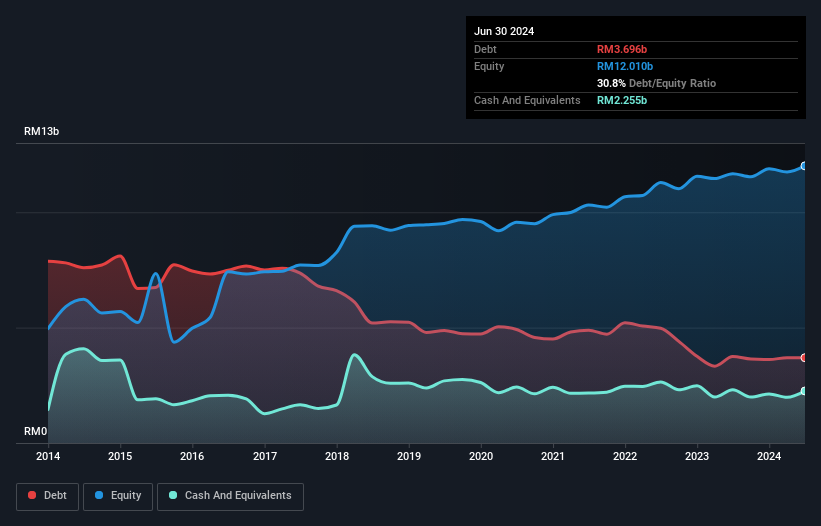Is IOI Corporation Berhad (KLSE:IOICORP) A Risky Investment?

David Iben put it well when he said, 'Volatility is not a risk we care about. What we care about is avoiding the permanent loss of capital.' So it might be obvious that you need to consider debt, when you think about how risky any given stock is, because too much debt can sink a company. We can see that IOI Corporation Berhad (KLSE:IOICORP) does use debt in its business. But is this debt a concern to shareholders?
Why Does Debt Bring Risk?
Debt assists a business until the business has trouble paying it off, either with new capital or with free cash flow. If things get really bad, the lenders can take control of the business. However, a more common (but still painful) scenario is that it has to raise new equity capital at a low price, thus permanently diluting shareholders. Having said that, the most common situation is where a company manages its debt reasonably well - and to its own advantage. When we examine debt levels, we first consider both cash and debt levels, together.
View our latest analysis for IOI Corporation Berhad
What Is IOI Corporation Berhad's Debt?
As you can see below, IOI Corporation Berhad had RM3.70b of debt, at June 2024, which is about the same as the year before. You can click the chart for greater detail. On the flip side, it has RM2.25b in cash leading to net debt of about RM1.44b.

How Healthy Is IOI Corporation Berhad's Balance Sheet?
We can see from the most recent balance sheet that IOI Corporation Berhad had liabilities of RM1.58b falling due within a year, and liabilities of RM4.35b due beyond that. Offsetting these obligations, it had cash of RM2.25b as well as receivables valued at RM1.41b due within 12 months. So its liabilities outweigh the sum of its cash and (near-term) receivables by RM2.27b.
Of course, IOI Corporation Berhad has a market capitalization of RM24.8b, so these liabilities are probably manageable. However, we do think it is worth keeping an eye on its balance sheet strength, as it may change over time.
We measure a company's debt load relative to its earnings power by looking at its net debt divided by its earnings before interest, tax, depreciation, and amortization (EBITDA) and by calculating how easily its earnings before interest and tax (EBIT) cover its interest expense (interest cover). Thus we consider debt relative to earnings both with and without depreciation and amortization expenses.
IOI Corporation Berhad has a low net debt to EBITDA ratio of only 0.94. And its EBIT covers its interest expense a whopping 10.3 times over. So we're pretty relaxed about its super-conservative use of debt. In fact IOI Corporation Berhad's saving grace is its low debt levels, because its EBIT has tanked 25% in the last twelve months. When a company sees its earnings tank, it can sometimes find its relationships with its lenders turn sour. There's no doubt that we learn most about debt from the balance sheet. But it is future earnings, more than anything, that will determine IOI Corporation Berhad's ability to maintain a healthy balance sheet going forward. So if you want to see what the professionals think, you might find this free report on analyst profit forecasts to be interesting.
Finally, while the tax-man may adore accounting profits, lenders only accept cold hard cash. So it's worth checking how much of that EBIT is backed by free cash flow. Over the most recent three years, IOI Corporation Berhad recorded free cash flow worth 66% of its EBIT, which is around normal, given free cash flow excludes interest and tax. This cold hard cash means it can reduce its debt when it wants to.
Our View
Based on what we've seen IOI Corporation Berhad is not finding it easy, given its EBIT growth rate, but the other factors we considered give us cause to be optimistic. In particular, we are dazzled with its interest cover. Considering this range of data points, we think IOI Corporation Berhad is in a good position to manage its debt levels. But a word of caution: we think debt levels are high enough to justify ongoing monitoring. The balance sheet is clearly the area to focus on when you are analysing debt. But ultimately, every company can contain risks that exist outside of the balance sheet. Case in point: We've spotted 1 warning sign for IOI Corporation Berhad you should be aware of.
If, after all that, you're more interested in a fast growing company with a rock-solid balance sheet, then check out our list of net cash growth stocks without delay.
New: AI Stock Screener & Alerts
Our new AI Stock Screener scans the market every day to uncover opportunities.
• Dividend Powerhouses (3%+ Yield)
• Undervalued Small Caps with Insider Buying
• High growth Tech and AI Companies
Or build your own from over 50 metrics.
Have feedback on this article? Concerned about the content? Get in touch with us directly. Alternatively, email editorial-team (at) simplywallst.com.
This article by Simply Wall St is general in nature. We provide commentary based on historical data and analyst forecasts only using an unbiased methodology and our articles are not intended to be financial advice. It does not constitute a recommendation to buy or sell any stock, and does not take account of your objectives, or your financial situation. We aim to bring you long-term focused analysis driven by fundamental data. Note that our analysis may not factor in the latest price-sensitive company announcements or qualitative material. Simply Wall St has no position in any stocks mentioned.
About KLSE:IOICORP
IOI Corporation Berhad
An investment holding company, primarily engages in the plantation business in Malaysia, Europe, North America, Asia, and internationally.
Flawless balance sheet with solid track record.
Similar Companies
Market Insights
Community Narratives





